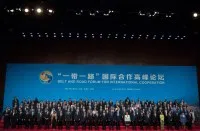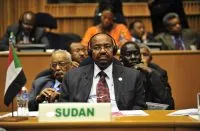The US’ Hybrid War on OBOR doesn’t stop at the military phase but importantly continues into the informational domain in order to undermine China’s New Silk Roads through the planting of Trumpist “time bombs” in strategic transit states that can only be neutralized by a comprehensive perception management strategy that breaks from the centralized model that Beijing is known for.
Two of the top three global trends that the author analyzed in his latest piece for Eurasia Future are Hybrid War Balkanization and Trumpism vs. Globalism, both of which are weapons of asymmetrical warfare against China’s One Belt One Road (OBOR) global vision of New Silk Road connectivity. The first actually contributes to the proliferation of the second, however, through the transition of a failed unconventional war to an indefinitely prolonged infowar that seeks to accomplish a pair of complementary objectives that will be explained in this analysis, the point of which is to draw attention to a little-known but very “politically incorrect” vulnerability afflicting the Silk Road. Simply put, China has a poor handle on perception management techniques outside of its borders, and it’s accordingly ill-equipped to confront the multitude of informational challenges that will inevitably confront its global OBOR ambitions.
The Phased Transition Of Anti-OBOR Operations
From Hybrid War…
To review the elementary basics of Hybrid Wars, these are externally provoked identity conflicts that exploit preexisting fault lines within a society in order to pressure the targeted government through manufactured “grassroots” means to enact political concessions advantageous to the offensive party under pain of having the conflict escalated to the point of pursuing regime change and/or a regime reboot (forced constitutional reform). Nowadays, however, “Democratic Security” strategies can be relied upon to lessen the impact of this asymmetrical onslaught and keep it at the low-intensity level, if not snuff it out completely, but the aggressive party might not be thwarted by this defeat and could instead leverage it through infowar means by decontextualizing, misportraying, and then over-amplifying weaponized narratives that could be similarly destabilizing for the victimized state if they’re not contained.
To Infowars…
The US’ intentions are to masterfully craft the false perception that the targeted state is too dangerous for other countries’ companies to do business with, let alone transit through en route to China, which could then diminish its Silk Road potential and consequently impact on China’s economic security by denying it the markets that it needs to offload its excess capacity to. This could in turn imperil its national growth depending on the transit country involved (Pakistan being the most important in this context) and potentially lead to an economic downturn with time that might eventually trigger political destabilization at home. Resultantly, it would be natural for the targeted state to grow more dependent on Chinese assistance as other countries distance themselves from it after falling for the US’ infowar narrative, but therein lays the second phase of the Hybrid War on OBOR
And Finally “Trumpism”:
The US learned from the example of Myanmar in the 2000s that states that become disproportionately dependent on China are much more susceptible to weaponized populism (i.e. “Trumpism”), which can be timed to explode precisely at the moment when Beijing is inversely becoming dependent on their transit and market potentials through OBOR. “Nationalist” reactions naturally form under these conditions, but these sentiments can also be shaped and guided from abroad through NGOs and social media perception engineering operations. The US was still experimenting with its efforts to attain “scenario superiority” over the Myanmar-China relationship and therefore executed its plans imperfectly, but the lasting lesson that it learned was that countries can indeed be forced into China’s embrace, after which the dynamics that organically develop between them could make the two partners “too close for comfort” and thus open up a valuable window of narrative opportunity for the US to exploit.
Scenario Review
To rehash the infowar dimension of the US’ Hybrid War on OBOR, the targeted state’s suppression of the initial violent phase of the Hybrid War doesn’t mean that the destabilization operation against it has stopped, as any infrequent and low-intensity violence that still occurs could be manipulatively used by the US and its allies to attack the country’s international reputation. The purpose of doing this is to decrease investor and entrepreneur confidence in the said state’s security capabilities, which could therefore scare them away from doing business there and utilizing its Silk Road transit infrastructure for facilitating trade with China. The predictable result would be that the targeted country becomes more dependent on China, though this too can be manipulated from abroad because it naturally produces a “nationalist” (“Trumpist”) reaction with time that could be weaponized to undermine Beijing after it becomes entwined in a complex system of economic-strategic interdependency there.
An oversimplification of this process is as follows:
Hybrid War à Infowar à Trumpism
The Perception Management Solution
The only way that this phased scenario can be countered is through proper perception management strategies, though this has unfortunately proven itself to be China’s Achilles’ heel because of its hitherto inability to effectively influence how others perceive its international activities. Confucius Institutes are only useful when it comes to apolitical soft power and fostering civil society interactions, while the interconnected concepts of OBOR and win-win cooperation aren’t anything necessarily specific to China (apart, in the first case, from its financing). The “Global Times” information outlet has a purpose, albeit a limited one because it’s already recognized by most of the world that this platform is a means for the Communist Party to “indirectly” send certain messages into the mainstream. The rigidity involved in this messaging operation makes it insufficiently inflexible for responding to the multitude of rapidly adapting infowar narratives targeting China, its partners, and their OBOR interests.
The solution is for China to learn from existing Mainstream and Alternative Media structures and either create a brand-new one from scratch or partner one of its existing platforms such as CGTN with a variety of its counterparts in key Silk Road states such as Pakistan, Iran, Russia, Turkey (the four other members of the Golden Ring), and Ethiopia. It must, however, “let go of the reins”, “loosen its grip”, and grant its employees the “professional liberty” to proactively expose infowar narratives while simultaneously promoting defensive ones for protecting the Silk Road states, though this must absolutely be done in coordination with China continuing to deliver tangible benefits to its partners’ population and not “overstepping” in its interactions with them otherwise this effort might come off as “propagandistic” and counterproductively backfire.
Because of how “revolutionary” it would be for a Chinese-backed international media outlet to “decentralize” its information operations, the first cadre of employees must be vetted and trusted by the authorities. The key to this initiative succeeding is for competent experts to be placed in positions of influence from where they could instantly react to changing infowar narratives instead of having to wait for the central authorities in Beijing to formulate specific talking points. Furthermore, because it’ll be based abroad and won’t broadcast in China, these figures could even walk the line of “political correctness” as needed (or even cross it under exceptional circumstances) in order to more effectively produce and disseminate certain narratives as needed. Again, given the nature of the Chinese system, vetted and trusted individuals should be the only ones placed in these roles, but sooner than later, China will need to experiment with this model if it is to succeed.
Concluding Thoughts
The US’ Hybrid War on OBOR is evolving to the point where the violent phase of this strategy might more easily be defeated by China’s many Silk Road partners than ever before, but these targeted states could still be caught equally unaware by the secondary infowar phase of this destabilization campaign if they aren’t careful. China conceives of itself as being the torchbearer of economic globalization and consequently free trade, but ironically, this means that business have the choice whether or not to trade with it, and if so, via which means. The manufacturing of false narratives pertaining to the security of CPEC and China’s other Silk Road corridors is very dangerous because it could easily lead to investors and entrepreneurs choosing to continue trading with the People’s Republic through the Strait of Malacca and across the South China Sea, thereby nullifying the strategic reason for OBOR’s cross-Eurasian mainland connectivity projects that were always intended to avoid putting China under the blackmailing influence of the powerful US Navy.
The American plan is to have China commit hundreds of billions of dollars to Eastern Hemispheric infrastructure projects and then provoke low-intensity and cost-effective Hybrid Wars in its many Silk Road partners so that it can have the basis on which to build a prolonged infowar campaign against them. This in turn could cause international investors and entrepreneurs to stay away from the country and stick to using US Navy-controlled maritime routes through the Strait of Malacca and South China Sea to trade with China, thus making it more difficult for the host nation to service its Chinese debt. This would accordingly drive the country closer to China, though this relationship might become uncomfortable after a period of time just like Myanmar’s did in the 2000s and give rise to a US-encouraged populist/nationalist (“Trumpist”) movement.
The end result is that China might never receive a return on its investments in the regime-changed state if a new pro-American “Trumpist” government defaults because Beijing has no means to enforce payment compliance, and the cumulative effect of this could be macro-economically disastrous if it’s timed to coincide with other such happenings elsewhere in the world, especially the countries where China has invested the most. Not only that, but the “economic nationalism” component of “Trumpism” could lead to a situation where China loses its previous de-facto free trade privileges in the ports and other points of access that it helped finance, despite how mutually destructive of a policy this would be for its former “partner” to commence (though the EU’s US-influenced sanctions prove that vassals will enact self-inflicted damage in order to please the hegemon). It goes without saying that the aforementioned strategy could kill the Silk Road if it succeeds and possibly even cause domestic political problems in China, which is why the People’s Republic must urgently improve its perception management operations abroad in order to defend itself from this doomsday scenario.
DISCLAIMER: The author writes for this publication in a private capacity which is unrepresentative of anyone or any organization except for his own personal views. Nothing written by the author should ever be conflated with the editorial views or official positions of any other media outlet or institution.




